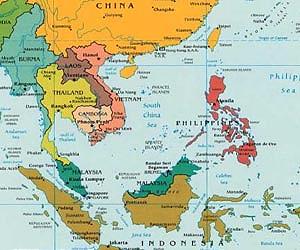
China insists it has complete sovereignty over the potentially resource-rich Spratly and Paracel islands in the South China Sea. However the Philippines, Vietnam, Malaysia, Brunei and Taiwan have competing claims.
Manila (AFP) Aug 9, 2010 - The Philippines said Monday that Southeast Asian nations did not need US help in solving territorial disputes with China over the potentially resource-rich South China Sea.
Foreign Secretary Alberto Romulo told reporters that negotiations should be strictly between the Association of Southeast Asian Nations (ASEAN) and China, without the United States or any other party.
Asked if he supported US Secretary of State Hillary Clinton's statement last month hinting at greater US involvement in the South China Sea dispute, Romulo said: "No".
Rejecting US interference Romulo stated: "It's ASEAN and China. Can I make myself clear? It's ASEAN and China. Is that clear enough?"
"It's ASEAN and China. Can I make myself clear? It's ASEAN and China. Is that clear enough?" Romulo told reporters.
China insists it has complete sovereignty over the potentially resource-rich Spratly and Paracel islands in the South China Sea. However the Philippines, Vietnam, Malaysia, Brunei and Taiwan have competing claims.
Clinton said at the ASEAN Regional Forum in Hanoi last month that the United States had an interest in guaranteeing open navigation and free trade in the South China Sea.
Clinton also called for multilateral talks to resolve the issue, a position long opposed by China, which wants to negotiate competing claims with each individual country.
Romulo said ASEAN continued to push for the implementation of the "code of conduct," an agreement signed with China in 2002 calling for peaceful settlement of the issue between all contending parties.
However it was merely a non-binding accord and ASEAN has been pressing China to make it binding.
"We will continue to discuss it and that has always been in our agenda," Romulo said.
Source: AFP via Energy Daily